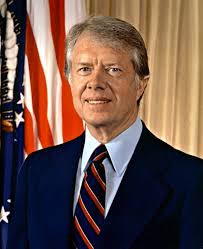Jimmy Carter
Image

Domestic Politics under the Carter Presidency
- Carter wanted to introduce a new style of presidency
- Broke with tradition after his inauguration by walking with his wife along Pennsylvania to the White House
- He had won the election partly because he was an outsider from a Southern state
- His inexperience in dealing with a Democrat dominated Congress created major problems
- He lacked a clear policy and this, and his lack of optimism, added to his problems in the future
- He saw the present as one big emergency and the future as marked by a sharp diminution of promise of American life
Economic Policy
- He used ‘demand side’ policies to stimulate the economy
- These had been the basis of US macroeconomic policy since WW2 but high fuel prices and foreign competition caused the US recession from the early 1970s
- This caused inflation and unemployment (stagflation)
- Stimulating demand with increased consumer spending served to increase inflation and the purchase of imports such as cars
- In the first years of the new Presidency unemployment dropped from 8% to 7%
- Inflation kept rising though – 10% by end 1978 and 13% by 1980
- Interest rates were 20%
- Inflation rate boosted in 1979 because of the Iranian revolution and fall of the Shah
- Also led to OPEC doubling the price of oil
- 23rd October 1979 Carter given power by Congress to ration petrol
- There was a nationwide reaction against a big-spending government
- 1978 a referendum in California accepted proposition 13 to cut taxes
- Other states followed
Changes in Government
- Carter had some successes
- Increased the number of people from ethnic minorities in government
- Highest profile appointment was that of Andrew Young as US ambassador to the UN
- Carter created the new Energy Department
- 1979 divided the Department of Health, Education and Welfare (HEW) into the separate departments of Education, Health and Human Services
1980 Elections
- Carter became first one-term President since WW2
- Lost 1980 election for number of reasons:
- Foreign affairs – US embassy staff in Iran taken hostage (not released till Jan 19810. He took responsibility for the failed military mission to free them
- 1979 USSR invaded Afghanistan
- Decision to boycott 1980 Moscow Olympics only added to his problems
- Economy in recession – high interest rates, inflation and unemployment
Reagan
- Carter’s opponent in the election
- Conservative Republican
- Former governor of California
- Supported new approach to the economy – ‘supply side’ economics
- Supported by fundamentalist religious groups - had grown in influence during 1970s
- Most influential – the ‘moral majority’ pressure group run by Rev. Jerry Falwell
- Backed also by women’s groups opposed to feminism
- Led by Phyllis Schafly and the National Right to Life Committee
- Latter had 11 million members by 1980
- The election proved to be the biggest rejection of an incumbent president since Hoover’s defeat in 1932
- Republicans won control of the Senate for first time since 1952
- Gained 33 seats in the House
- Main cause of this Republican landslide was the discontent with unemployment, inflation and the poor performance of the economy
- Also the voters wanted a stronger foreign policy and decisive leadership
- This election heralded a fundamental change in US domestic history
- The two terms of Reagan’s presidency became known as ‘The Reagan Revolution’
